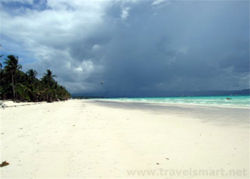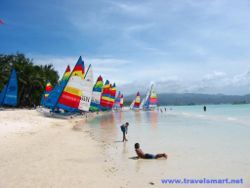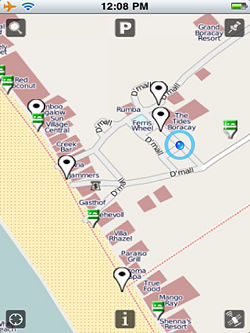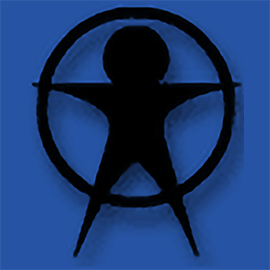Category:Asia/Philippines/Aklan/Malay/Boracay/
Boracay
Overview



Boracay Island is located off the northwest corner of the island of Panay, and belongs to the Western Visayas island-group, or Region VI, of the Philippines. The island is approximately seven kilometers long, dog-bone shaped with the narrowest spot being less than one kilometer wide, and has a total land area of 10.32 square kilometers..[1]
South-facing Cagban Beach is located across a small strait from the jetty port at Caticlan on Panay island, and the Cagban jetty port serves as Boracay's main entry and exit point during most of the year. When wind and sea conditions dictate, east-facing Tambisaan Beach serves as an alternative entry and exit point.[2]
Boracay's two primary tourism beaches, White Beach and Bulabog Beach, are located on opposite sides of the island's narrow central area. White Beach faces westwards and Bulabog Beach faces eastwards. The island also has several other beaches.[2]
White Beach, with its blindingly white and powdery sand, is the main tourism beach. It is a bit over four kilometers long and is lined with resorts, hotels, lodging houses, restaurants, and other tourism-related businesses. In the central portion, for about two kilometers, there is a footpath known as the Beachfront Path separating the beach itself from the establishments located along it. North and south of the Beachfront Path, beachfront establishments do literally front along the beach itself. Several roads and paths connect the Beachfront Path with Boracay's Main Road, a vehicular road which runs the length of the island. At the extreme northern end of White Beach, a footpath runs around the headland there and connects White Beach with Diniwid Beach.[2]
Across the island from White Beach is Bulabog Beach, a secondary tourism beach and Boracay's main windsurfing and kiteboarding area.[2]
History
Malay[1], Aklan, Philippines
The Republic of the Philippines, to give it its official title, is made up of 7,107 islands, although the majority of its almost 98 million population lives on just 11 of those islands. The country is divided into the three main geographical divisions of Luzon, Visayas and Mindanao.
The Luzon group of islands includes Luzon itself, the largest island and home to the capital city, Manila. The next largest island is Mindanao, which lends its name to the group of islands also including the Sulu Archipelago. The Visayas division is a group of several small islands including Panay[2], Bohol and Negros.
In Panay is the famous Boracay Island[3]. Boracay Island is located off the northwest corner of Panay in Region VI of the Philippines. The island is approximately seven kilometers long, dog-bone shaped with the narrowest spot being less than one kilometer wide, and has a total land area of 10.32 square kilometers. The name Boracay has various rumoured origins[4]. One of which was that it is drived from the local word of borac or sagay which means cotton in reference to the white cotton like colour and texture of Boracays sand.
The Native Islanders and Ati lived together in harmony in the island. The Ati are the indiginous people[5] of Boracay, being the first settlers and were farmers and fishermen.
Fishing , Copra and Tobacco (first class products believed to have been introduced and propagated by the Greener of Boracay[6]. Dona Sofing[7] and traded on the nearby mainland of Aklan ) were the main trades of the island. It was only in the late 70's when the main income of the island changed to tourism when tourists started to arrive.
It is often told that Boracay Beach has a shaded and uncertain past[8][9]. This is because the island in the early 1900's was just one private[10] home of the Ati, the islanders and a couple belonging to one of the prominent families in Aklan. They were considered to be the original settlers of the island[11].
It all began when Lamberto H. Tirol[12][13] and Sofia Ner Gonzales[14][15] settled in the island. They lived among the islanders. There weren't too many people that time so that life was simple. As fishing was the main livelihood, the couple began to cultivate the land, planted millions of trees and plants. Even upon the demise of Don Lamberto H. Tirol, cultivation continued, progressed, and trade continually existed under the watch of the young widow Dona Sofia Ner Gonzales vda. de Tirol. It was to this contribution that she gained recognition as the "Woman behind the greening of Boracay Island"[16]
A large portion of Boracay is state - owned [17][18] [19] [20], except for the lots of Lamberto H. Tirol and Sofia Ner Gonzales, along with the others like Ciriaco Tirol and other Aklan-rooted kin who were able to obtained land titles over portions of the island in the early pre-war years. Among the private owners are the heirs of Don Lamberto H. Tirol and Sofia Ner Gonzales, the heirs of Don Ciriaco Tirol, the Elizalde, Carpio, Andan, Solidum, Dignos, Sarabia, Menez, Kimpo, Dimacali, Tan, Marte, and Rojo. Recent Supreme Court pronouncement upheld the State's ownership saved in the cases of the Tirol Family of Aklan and their predecessors in interests whose rights are preferred[21]. Various government agencies vowed to protect and preserve boracay. We believe that is likewise the sentiments of the inhabitants of the island.
Boracay’s first visitors were mainly Europeans - German tourists, and the Swiss even jokingly called Boracay a ‘Canton of Switzerland’ or so we heard. Eventually, more foreigners visit the island which contributed to the multicultural facets of Boracay’s culinary choices and the island’s further development in terms of accommodation, activities, and eating. Nowadays, Boracay is not a private and unspoilt paradise like it used to be under the watch of Dona Sofing, but a major tourist and holiday destination for the Philippines[22].
For Further Reading:
- [23] Boracay Etymology
- [24] The Sunday Times Magazine, November 8, 1987 Coverage: Boracay Island, Philippines, Southeast AsiaHistorical Newspaper: The Sunday Times Magazine, November 8, 1987 (November 8, 1987)
- [25] Boracay in Pictures, then and now.
- [26] DENR to initiate greening projects in Boracay
- [27]Real Estate Articles
- [28] Boracay
- [29] Boracay History
- [30] Boracay Unknown History
- [31] Cambridge Central Asia Academic Studies
- [32] Boracay Island
- [33] Only about a third of the land on Boracay has titles while the rest is occupied through tax declarations after the island resort was declared government property.
- [34] History of the Tirol Surname
- [35] Lamberto Hontiveros Tirol
- [36] Sofia Ner Gonzales
- [37] Department of Justice
- [38] Land Registration Authority
- [39] Environmental Management Bureau
- [40] Department of Environment and Natural Resources
- [41] Environmental Management Bureau Region VI
Getting There


- All flights to Boracay are either via Kalibo or Caticlan from the Manila Domestic Airport. The Kalibo Airport is located around an hour and a half from the boat launch in Caticlan. The Caticlan Airport is located around 15 minutes from the boat launch. Domestic flights to Kalibo are via Philippine Airlines, Cebu Pacific and Air Philippines. Philippine Airlines Express, Cebu Pacific, Seair and Zest Air fly direct to Caticlan. Upon arrival in Kalibo, transfers to the boat launch in Caticlan is done by airconditioned vans and buses. The trip takes approximately 1 1/2 hours (70 kms). The boat (bangka) ride from Caticlan to the Boracay Jetty Port takes around 20 minutes. Upon arrival, visitors have the choice of riding tricycles or passenger vans to their resort.[3]
- Airlines
- Kalibo to Caticlan Transportation
- Minivans - P200/person
- Caticlan to Boracay Island Ferry
- Caticlan/Cagban Jetty Port and Passenger Terminal Fee - PhP20.00/person
- Environmental & Admission Fee - PhP50.00/person
- Caticlan-Boracay Transport Fee - PhP19.50/person
Spas
- Nami Boracay Spa
- Mandala Spa is one of the finest Asian destination spas, offering luxury accommodations and award winning holistic spa therapies in a lush tropical sanctuary overlooking Boracay’s renowned white beach. It was voted Destination Spa of the Year and Spa Treatment of the Year for Watsu at the Baccarat AsiaSpa Awards 2005 and Best Rejuvenation Program at the SpaAsia Crystal Awards in 2004.[4]
Dive Shops
- Calypso Dive Shop
- Victory Divers
- Scuba World Boracay
- Blue Mango Boracay Beach Resort & Dive Shop
Shopping Centers
- D'Mall
- D'Talipapa Boracay
- Tourist Center Boracay
Places of Worship
- Holy Rosary Parish Boracay
- Iglesia ni Kristo
Other Attractions
Articles
- Tips on Getting To and Around Boracay – 2009
- A 360-degree tour of RP
- Inter-island hop to paradise: A RORO journey to Boracay
- Hobie Cat Regatta Sails from Quezon to Boracay
- Boracay From Above
Related Links
References
- ↑ Boracay Wikipedia.ORG. Accessed September 2007.
- ↑ 2.0 2.1 2.2 2.3 Cite error: Invalid
<ref>tag; no text was provided for refs named"wikipedia" - ↑ Boracay Transportation TravelSmart.NET. Accessed October 2007.
- ↑ Boracay Bliss TravelSmart.NET. Accessed October 2007.
Gallery
Subcategories
This category has only the following subcategory.
Pages in category "Asia/Philippines/Aklan/Malay/Boracay/"
The following 199 pages are in this category, out of 199 total.
A
- Asia/Philippines/Aklan/Malay/Boracay/357 Boracay/
- Asia/Philippines/Aklan/Malay/Boracay/7 Stones Boracay/
- Asia/Philippines/Aklan/Malay/Boracay/Ababu Persian Kitchen/
- Asia/Philippines/Aklan/Malay/Boracay/Alice Boracay Resort/
- Asia/Philippines/Aklan/Malay/Boracay/All Flip-flops/
- Asia/Philippines/Aklan/Malay/Boracay/Allied Bank/
- Asia/Philippines/Aklan/Malay/Boracay/Alta Vista De Boracay/
- Asia/Philippines/Aklan/Malay/Boracay/Ambassador in Paradise Resort/
- Asia/Philippines/Aklan/Malay/Boracay/Angol Point Beach Resort/
- Asia/Philippines/Aklan/Malay/Boracay/Aqua Boracay/
- Asia/Philippines/Aklan/Malay/Boracay/Artista Beach Villas/
- Asia/Philippines/Aklan/Malay/Boracay/Astoria Boracay/
- Asia/Philippines/Aklan/Malay/Boracay/Asya Premier Suites/
- Asia/Philippines/Aklan/Malay/Boracay/Balinghai Beach Resort/
- Asia/Philippines/Aklan/Malay/Boracay/Bamboo Beach Resort and Restaurant/
- Asia/Philippines/Aklan/Malay/Boracay/Bank of the Philippine Islands/
- Asia/Philippines/Aklan/Malay/Boracay/Bans Beach Resort/
- Asia/Philippines/Aklan/Malay/Boracay/Banyugan Beach/
- Asia/Philippines/Aklan/Malay/Boracay/Beachcomber Resort/
- Asia/Philippines/Aklan/Malay/Boracay/Bella Vista De Boracay/
- Asia/Philippines/Aklan/Malay/Boracay/Blue Bayou/
- Asia/Philippines/Aklan/Malay/Boracay/Blue Lilly Villa/
- Asia/Philippines/Aklan/Malay/Boracay/Blue Mango Inn/
- Asia/Philippines/Aklan/Malay/Boracay/Blue Wave Beach House/
- Asia/Philippines/Aklan/Malay/Boracay/Bolabog Beach/
- Asia/Philippines/Aklan/Malay/Boracay/Bora Budget Mart/
- Asia/Philippines/Aklan/Malay/Boracay/Boracay 68 Beach Resort/
- Asia/Philippines/Aklan/Malay/Boracay/Boracay Beach Chalets/
- Asia/Philippines/Aklan/Malay/Boracay/Boracay Breeze/
- Asia/Philippines/Aklan/Malay/Boracay/Boracay Butterfly Garden/
- Asia/Philippines/Aklan/Malay/Boracay/Boracay Courtyard Beach Resort/
- Asia/Philippines/Aklan/Malay/Boracay/Boracay Dream Beach Resort/
- Asia/Philippines/Aklan/Malay/Boracay/Boracay Eco Village and Training Center/
- Asia/Philippines/Aklan/Malay/Boracay/Boracay Garden Resort/
- Asia/Philippines/Aklan/Malay/Boracay/Boracay Hideaway/
- Asia/Philippines/Aklan/Malay/Boracay/Boracay Hills/
- Asia/Philippines/Aklan/Malay/Boracay/Boracay Holiday Resort/
- Asia/Philippines/Aklan/Malay/Boracay/Boracay Mandarin Island Hotel/
- Asia/Philippines/Aklan/Malay/Boracay/Boracay National High School/
- Asia/Philippines/Aklan/Malay/Boracay/Boracay Ocean Club Beach Resort/
- Asia/Philippines/Aklan/Malay/Boracay/Boracay Peninsula/
- Asia/Philippines/Aklan/Malay/Boracay/Boracay Plaza/
- Asia/Philippines/Aklan/Malay/Boracay/Boracay Regency Beach Resort/
- Asia/Philippines/Aklan/Malay/Boracay/Boracay Sands Hotel/
- Asia/Philippines/Aklan/Malay/Boracay/Boracay Terraces Resort/
- Asia/Philippines/Aklan/Malay/Boracay/Boracay Tropics Resort Hotel/
- Asia/Philippines/Aklan/Malay/Boracay/Boracay Tropics/
- Asia/Philippines/Aklan/Malay/Boracay/Boracayrealty,com/
- Asia/Philippines/Aklan/Malay/Boracay/Bpi/
- Asia/Philippines/Aklan/Malay/Boracay/Bread & Butter/
- Asia/Philippines/Aklan/Malay/Boracay/Cafe Del Sol/
- Asia/Philippines/Aklan/Malay/Boracay/Cafe Mediterranean/
- Asia/Philippines/Aklan/Malay/Boracay/Cagban Jetty Port/
- Asia/Philippines/Aklan/Malay/Boracay/Canyon de Boracay/
- Asia/Philippines/Aklan/Malay/Boracay/Casa Pilar Beach Resort/
- Asia/Philippines/Aklan/Malay/Boracay/Chalet Tirol Beach House/
- Asia/Philippines/Aklan/Malay/Boracay/Chalet Y/
- Asia/Philippines/Aklan/Malay/Boracay/Club Manila East Beach Resort/
- Asia/Philippines/Aklan/Malay/Boracay/Club Manila East/
- Asia/Philippines/Aklan/Malay/Boracay/Club Panoly Resort/
- Asia/Philippines/Aklan/Malay/Boracay/Club Paraw/
- Asia/Philippines/Aklan/Malay/Boracay/Club Ten Beach Resort/
- Asia/Philippines/Aklan/Malay/Boracay/Cocomangas Hotel Beach Resort/
- Asia/Philippines/Aklan/Malay/Boracay/Cohiba Villas/
- Asia/Philippines/Aklan/Malay/Boracay/Crafts of Boracay/
- Asia/Philippines/Aklan/Malay/Boracay/Crown Regency Resort/
- Asia/Philippines/Aklan/Malay/Boracay/Crown Regency/
- Asia/Philippines/Aklan/Malay/Boracay/Crystal Sand Beach Resort/
- Asia/Philippines/Aklan/Malay/Boracay/Cyma/
- Asia/Philippines/Aklan/Malay/Boracay/D'Mall/
- Asia/Philippines/Aklan/Malay/Boracay/Diniwid Beach/
- Asia/Philippines/Aklan/Malay/Boracay/Discovery Shores Boracay Island/
- Asia/Philippines/Aklan/Malay/Boracay/Dream Spa and Villas/
- Asia/Philippines/Aklan/Malay/Boracay/Eclipse Resort Boracay/
- Asia/Philippines/Aklan/Malay/Boracay/El Centro Island Beach Resort/
- Asia/Philippines/Aklan/Malay/Boracay/English Bakery and Tea Room/
- Asia/Philippines/Aklan/Malay/Boracay/Erus Suite Hotel/
- Asia/Philippines/Aklan/Malay/Boracay/Escondido Beach Resort/
- Asia/Philippines/Aklan/Malay/Boracay/Estacio Uno/
- Asia/Philippines/Aklan/Malay/Boracay/Fat Jimmy's Resort/
- Asia/Philippines/Aklan/Malay/Boracay/Friday's Resort/
- Asia/Philippines/Aklan/Malay/Boracay/Grand Boracay Resort/
- Asia/Philippines/Aklan/Malay/Boracay/Grand Vista Boracay Resort and Spa/
- Asia/Philippines/Aklan/Malay/Boracay/Gully's Island/
- Asia/Philippines/Aklan/Malay/Boracay/Habagat Kite Village Aissatou Beach Resort/
- Asia/Philippines/Aklan/Malay/Boracay/Hangin Kite Center/
- Asia/Philippines/Aklan/Malay/Boracay/Hayan Spa & Resort/
- Asia/Philippines/Aklan/Malay/Boracay/Heather's/
- Asia/Philippines/Aklan/Malay/Boracay/Hey! Jude Resort Hotel/
- Asia/Philippines/Aklan/Malay/Boracay/Holy Rosary Parish Boracay/
- Asia/Philippines/Aklan/Malay/Boracay/Hotel Isla Boracay/
- Asia/Philippines/Aklan/Malay/Boracay/Hotel Soffia Boracay/
- Asia/Philippines/Aklan/Malay/Boracay/Ilig-Iligan Beach/
- Asia/Philippines/Aklan/Malay/Boracay/Jonah's Fruitshake/
- Asia/Philippines/Aklan/Malay/Boracay/Jonys Beach Resort/
- Asia/Philippines/Aklan/Malay/Boracay/Kasbah Moroccan Cafe/
- Asia/Philippines/Aklan/Malay/Boracay/Kikko's Boracay Beach Resort/
- Asia/Philippines/Aklan/Malay/Boracay/La Bella Casa De Boracay/
- Asia/Philippines/Aklan/Malay/Boracay/La Carmela de Boracay Resort Hotel/
- Asia/Philippines/Aklan/Malay/Boracay/La Fiesta Resort/
- Asia/Philippines/Aklan/Malay/Boracay/La Plage de Boracay Resort/
- Asia/Philippines/Aklan/Malay/Boracay/La Reserve Beach Hotel/
- Asia/Philippines/Aklan/Malay/Boracay/Laguna de Boracay/
- Asia/Philippines/Aklan/Malay/Boracay/Lan Spa de Boracay/
- Asia/Philippines/Aklan/Malay/Boracay/Lapus-lapus Beach/
- Asia/Philippines/Aklan/Malay/Boracay/Las Brisas de Boracay/
- Asia/Philippines/Aklan/Malay/Boracay/Le Soleil De Boracay Hotel/
- Asia/Philippines/Aklan/Malay/Boracay/Little Prairie Inn/
- Asia/Philippines/Aklan/Malay/Boracay/Mabuhay Beach House/
- Asia/Philippines/Aklan/Malay/Boracay/Manana Mexican Cuisine/
- Asia/Philippines/Aklan/Malay/Boracay/Mandala Spa and Villas/
- Asia/Philippines/Aklan/Malay/Boracay/Mango-Ray Resort/
- Asia/Philippines/Aklan/Malay/Boracay/Manoc-Manoc Beach/
- Asia/Philippines/Aklan/Malay/Boracay/Margarita Rock Lounge/
- Asia/Philippines/Aklan/Malay/Boracay/Mayumi Beach House/
- Asia/Philippines/Aklan/Malay/Boracay/Microtel Inn and Suites/
- Asia/Philippines/Aklan/Malay/Boracay/Mika's Place/
- Asia/Philippines/Aklan/Malay/Boracay/Milflores de Boracay/
- Asia/Philippines/Aklan/Malay/Boracay/Monaco Suites De Boracay/
- Asia/Philippines/Aklan/Malay/Boracay/Nami Private Villas Beach Resort/
- Asia/Philippines/Aklan/Malay/Boracay/Nandana Boracay Beach Hotel/
- Asia/Philippines/Aklan/Malay/Boracay/Nigi Nigi Too Beach Resort/
- Asia/Philippines/Aklan/Malay/Boracay/Nigi-Nigi Nu Noos Beach Resort/
- Asia/Philippines/Aklan/Malay/Boracay/Niu Ohana Garden Resort/
- Asia/Philippines/Aklan/Malay/Boracay/Obama Grill/
- Asia/Philippines/Aklan/Malay/Boracay/One Crescent Place Hotel/
- Asia/Philippines/Aklan/Malay/Boracay/One MGM/
- Asia/Philippines/Aklan/Malay/Boracay/One White Beach/
- Asia/Philippines/Aklan/Malay/Boracay/Orinda Beach Resort/
- Asia/Philippines/Aklan/Malay/Boracay/Oro Beach Resort/
- Asia/Philippines/Aklan/Malay/Boracay/Palm Breeze Villa/
- Asia/Philippines/Aklan/Malay/Boracay/Paradise Garden Resort Hotel/
- Asia/Philippines/Aklan/Malay/Boracay/Patio Pacific Resorts/
- Asia/Philippines/Aklan/Malay/Boracay/Pearl of the Pacific Beach Resort/
- Asia/Philippines/Aklan/Malay/Boracay/Philippine Chamber of Commerce and Industry/
- Asia/Philippines/Aklan/Malay/Boracay/Pirate's Arm Bar and Restaurant/
- Asia/Philippines/Aklan/Malay/Boracay/Poseidon Spa And Resort/
- Asia/Philippines/Aklan/Malay/Boracay/Puca Beach/
- Asia/Philippines/Aklan/Malay/Boracay/Puka Grande/
- Asia/Philippines/Aklan/Malay/Boracay/Punta Rosa Boutique Hotel/
- Asia/Philippines/Aklan/Malay/Boracay/Punta-Bunga Beach/
- Asia/Philippines/Aklan/Malay/Boracay/Queen's Beach Resort/
- Asia/Philippines/Aklan/Malay/Boracay/Real Maris Beach Resort/
- Asia/Philippines/Aklan/Malay/Boracay/Red Coconut Beach Resort/
- Asia/Philippines/Aklan/Malay/Boracay/Regency Lagoon Resort/
- Asia/Philippines/Aklan/Malay/Boracay/Residencia Boracay/
- Asia/Philippines/Aklan/Malay/Boracay/Rising Sun Beach Resort and Spa/
- Asia/Philippines/Aklan/Malay/Boracay/Ristorante Italiano/
- Asia/Philippines/Aklan/Malay/Boracay/Robinson Beach House/
- Asia/Philippines/Aklan/Malay/Boracay/Royal Park Resort Hotel/
- Asia/Philippines/Aklan/Malay/Boracay/Sand Castles Beach Resort/
- Asia/Philippines/Aklan/Malay/Boracay/Sand Castles The Apartments/
- Asia/Philippines/Aklan/Malay/Boracay/Sandals Inn/
- Asia/Philippines/Aklan/Malay/Boracay/Sangria/
- Asia/Philippines/Aklan/Malay/Boracay/Sea Shore Grill Restaurant/
- Asia/Philippines/Aklan/Malay/Boracay/Sea Wind Beach Resort/
- Asia/Philippines/Aklan/Malay/Boracay/Seraph Hayan Jacuzzi Villa/
- Asia/Philippines/Aklan/Malay/Boracay/Shangri-La Boracay Resort and Spa/
- Asia/Philippines/Aklan/Malay/Boracay/Shore Time Hotel Boracay/
- Asia/Philippines/Aklan/Malay/Boracay/Starbucks Coffee/
- Asia/Philippines/Aklan/Malay/Boracay/Steakhouse Boracay/
- Asia/Philippines/Aklan/Malay/Boracay/Sultana/
- Asia/Philippines/Aklan/Malay/Boracay/Summer Place/
- Asia/Philippines/Aklan/Malay/Boracay/Sun Villa Boracay Private Home/
- Asia/Philippines/Aklan/Malay/Boracay/Sur Beach Resort/
- Asia/Philippines/Aklan/Malay/Boracay/Surfside Boracay Resort and Spa/
- Asia/Philippines/Aklan/Malay/Boracay/Swiper's Inn/
- Asia/Philippines/Aklan/Malay/Boracay/Tambisaan Beach/
- Asia/Philippines/Aklan/Malay/Boracay/Tanawin/
- Asia/Philippines/Aklan/Malay/Boracay/The Boracay Beach Resort/
- Asia/Philippines/Aklan/Malay/Boracay/The Q Lodge/
- Asia/Philippines/Aklan/Malay/Boracay/The Sitio Boracay/
- Asia/Philippines/Aklan/Malay/Boracay/The Strand Boracay/
- Asia/Philippines/Aklan/Malay/Boracay/The Sun Village Beachfront Resort/
- Asia/Philippines/Aklan/Malay/Boracay/The Tides Boracay/
- Asia/Philippines/Aklan/Malay/Boracay/Tonglen Beach Resort/
- Asia/Philippines/Aklan/Malay/Boracay/Tourist Center/
- Asia/Philippines/Aklan/Malay/Boracay/Tree House Resort and Bar/
- Asia/Philippines/Aklan/Malay/Boracay/True Food/
- Asia/Philippines/Aklan/Malay/Boracay/True Home Hotel/
- Asia/Philippines/Aklan/Malay/Boracay/Tulubhan Beach/
- Asia/Philippines/Aklan/Malay/Boracay/Turtle Inn Resort/
- Asia/Philippines/Aklan/Malay/Boracay/Two Seasons/
- Asia/Philippines/Aklan/Malay/Boracay/Velis Inn Boracay/
- Asia/Philippines/Aklan/Malay/Boracay/Villa Camilla Resort/
- Asia/Philippines/Aklan/Malay/Boracay/Villa Camilla/
- Asia/Philippines/Aklan/Malay/Boracay/Villa de Oro Hotel and Restaurant/
- Asia/Philippines/Aklan/Malay/Boracay/Villa Kaloo/
- Asia/Philippines/Aklan/Malay/Boracay/Villa Mariposa/
- Asia/Philippines/Aklan/Malay/Boracay/Villa Rhazel Resort Hotel/
- Asia/Philippines/Aklan/Malay/Boracay/Villa Sunset Boracay/
- Asia/Philippines/Aklan/Malay/Boracay/White Beach/
- Asia/Philippines/Aklan/Malay/Boracay/White House Beach Resort/
- Asia/Philippines/Aklan/Malay/Boracay/Willy's Beach Resort/
- Asia/Philippines/Aklan/Malay/Boracay/Windpia/
- Asia/Philippines/Aklan/Malay/Boracay/Yapak Elementary School/
- Asia/Philippines/Aklan/Malay/Boracay/Yellow Cab Pizza Station One/
- Asia/Philippines/Aklan/Malay/Boracay/Yellow Cab Pizza/
- Asia/Philippines/Aklan/Malay/Boracay/Zuzuni Boutique Hotel and Restaurant/



